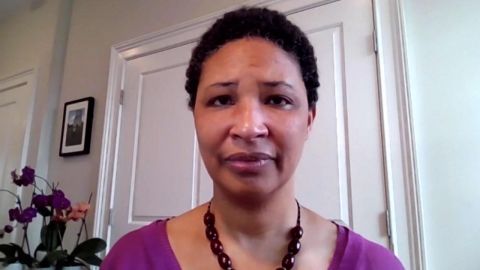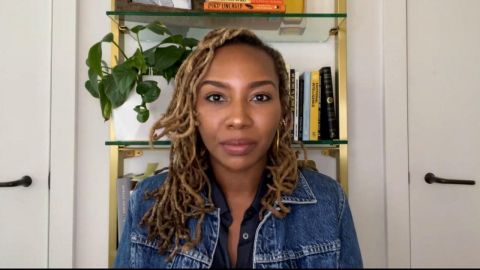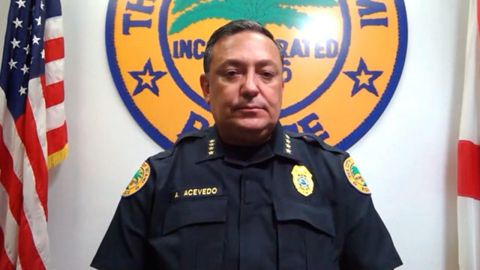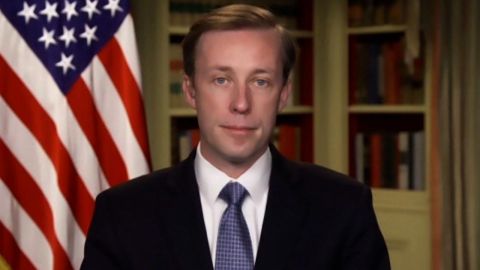Read Transcript EXPAND
CHRISTIANE AMANPOUR: Now, to understand this profound moment, we need to look back over 2,000 years, all the way back to Ancient Greece. Here is Harvard professor, Daniel Allan, talking with Walter Isaacson about the Chauvin’s verdict’s potential impact on police reform.
WALTER ISAACSON: Thank you, Christiane. And, Professor Danielle Allen, welcome to the show.
DANIELLE ALLEN, JAMES BRYANT CONANT UNIVERSITY PROFESSOR, HARVARD UNIVERSITY: Thanks, Walter. Good to be here.
ISAACSON: Can you help put into historical context this verdict in the Derek Chauvin case that happened this week?
ALLEN: You have to recognize that this effort to hold police officer accountable for a killing has been years in the making. We have to go back to 2014 when Michael Brown was shot in the streets of Ferguson, Missouri to understand this moment. People have watched police officers get away with really quite dramatic examples of excessive violence for a long-time and have been working hard to change dynamic. And yesterday we got, I hope, the beginning of the end of an accountable policing.
ISAACSON: And you use the word hope. What — unpack that word for me. What are you hoping?
ALLEN: We have watched over the last 50 years as our country has built a much more intense, much more punitive version of our criminal justice system, and that is true about sentencing but it’s also true about how policing operates. We have watched the increasing militarization of the police. They are arming with much higher levels of weaponry and military style tactics and the like. As it happens, it’s also the case that policing has always come down hardest on communities of color in this country. And so, when you put those two things together, the historical patterns of racial disparity in policing with the real intensification of police force and police violence over the last 50 years, you get a really extraordinary form of destruction of communities of color. It’s been really bad. And so, the hope is that this is the beginning of turning that around. You can’t turn that around unless you can hold people who use excessive force accountable and there’s been a real struggle to hold police officers who use excessive force accountable.
ISAACSON: Let’s go a little bit deeper. Put it in the context of the struggle for civil rights and for the institutions that define public safety over the past 50, 60, 70 years.
ALLEN: Well, it does seem as if our country just has a continuous fight around civil rights, racial justice. Every generation seems to reach a point, a deep point of tragic confrontation with this issue and then needs to move forward from it. So, from my generation, it was 1992 and the Rodney King events when Rodney King was so badly beaten by police officers was caught on video. That was a transformative moment. And then from my parent’s generation, it was the ’50s and the ’60s. My father remembers the lynching of Emmett Till and the open casket at the funeral and then the incredible movement towards civil rights efforts that that event brought. So, that civil rights moment was one where, again, African-Americans stood up and said, enough is enough. There is too much violence against us in this country. We need fundamental change. And then, that civil rights moment, the fundamental change that was achieved was the Voting Rights Act, the Civil Rights Act, the end of legal segregation across different domains of the public sector. Now, we have a new problem, which, again, is this remarkable excessive approach to policing and excessively penal system.
ISAACSON: Your father, whom you just mentioned, was — this is a distinguished writer. Tell me what he bequeathed to you in the sense of the history that he and now you are a part of?
ALLEN: Well, my father always had a twinned recognition of the problems of racial injustice in this country and an appreciation for the promise of emancipation that the founding ideals of the constitution of declaration articulate. We often think of the Declaration of Independence, for example, as a document that was written by, say, Thomas Jefferson. Somebody who help slaves. Maybe we should just reject it out of hand. In fact, that’s not the way of thing about that document. Jefferson was one among many people who contributed to it. He was the lead draftsman on a committee. But the intellectual architects included people like John Adams who were against enslavement. And in fact, the tax was then next used by abolitionists starting from 1777. And moving forward, it really is an abolition document. It supported the cause against enslavements. And I’m not the only person who sees that prospect for emancipation of that document. Benjamin Crump is the lawyer who has really architected this effort against policing and excessive police violence in the present. He was the lawyer for the Trayvon Martin family, for Michael Brown’s family. Also, now, for George Floyd and his family. And he has published a book a couple of years ago that concludes with the discussion of the Declaration of Independence and the way its articulation of grievances and complaints against excessive police force directly pertain to our contemporary circumstances.
ISAACSON: I’m going to take you then even further back in history because your main training early on in your academic career was as a classicist with Ancient Greece and Rome. You write about Prometheus and the question of punishment and you, of course, write about Plato. I was wondering, there’s an old classical phrase, it’s quis custodiet ipsos custodes, which means, who’s going to guard the guard. Who’s going to watch over the watchmen.
ALLEN: Yes.
ISAACSON: Tell us about that concept and how, from ancient times, the question is going to look out over the police and who is going to police the police has become part of our notion of justice.
ALLEN: Well, that is the ancient question. You know, Plato and his republic ask that question. He recognizes that in order to have a healthy society that could be safe from adversaries, whether external or internal, you would need, as you call them, Guardians. And then the question was, well, once you equip Guardians with power, power of military force or power of armed force, who guards the Guardians, who keeps them on the track for justice. It’s interesting that in contemporary policing there is a lot of conversation about the need to shift from a warrior mentality to a guardian mentality. I think that’s exactly right. But I think there’s more that could be said. Actually, I think, we need a broader cultural shift. One of the distinctive features of punishments in antiquity was that a routine punishment was exile. Now, exile, that sounds very, obviously, foreign to us. We don’t have it anymore. It’s not been a part of punishment since the middle of the 19th century. And this is a really important thing because what exile was actually was a second chance. It meant that people could go establish themselves in a new community and try again. And what has really disappeared from our whole approach to punishment is the capacity to support second chances for people. That takes me back to the point I was making about the excessive punitiveness, excessive penalty of our current approach to justice. We really need to rebuild a culture that supports redemption, a culture that supports second chances, a culture that supports cultivating healthy relationships within communities. And those healthy relationships within communities require a very different approach to policing than what we’ve seen for the last few decades.
ISAACSON: And so, how do you tie the drive for police reform with the drive for justice and second chances for people who have been arrested?
ALLEN: So, for starters, one of the things we need to do is actually just take policing out of context where it doesn’t really belong. So, I think if you even talk to members of the police, you’ll find that they’ll say, there a whole lot of things they get called for that they wish they didn’t have to do. Lots of those calls for mental health situations, for example, or calls that are about unhoused people. There’s all kinds of service calls police get that they shouldn’t get. They bring guns into them. And so, then a situation that might have been handled from a health perspective or from a social services perspective can easily escalate into something far more dangerous and deadly. So, in first instance, I think what we really need to do is actually take another look at all of the mandates, legislative mandates often around the country that require police to respond to situations that they are not the right first responders to. We also really have to look at our 911 system. That practice of always calling 911 is part of what brings the police into all kinds of situations again that they shouldn’t be in. We really need to be able to dispatch other kinds of providers to situations where policing is not necessary. There are some municipalities that have experimented with this and the remarkable thing is it does reduce incidences of violence that emerged from these encounters, it also actually reduces the cost of policing, its cost saving from municipalities to make these kinds of changes.
ISAACSON: You’ve brought the historical studies that we’re talking about now all the way back to Plato. One of the things in the republic is the Ring of Gyges where you put it on and people can’t see what you’re doing. And of course, he discusses, would you be well-behaved if you were anonymous, if you couldn’t be seen. This trial showed us the power of a 17-year-old with a cell phone and that notion that all of us can now watch each other and do cellphones. How is that loss of anonymity, this ability for people to videotape each other and then use social media? How is that changing the concept of justice?
ALLEN: The Ring of Gyges is this mythical idea, as you said, of having this ring that makes you invisible so that you can get away with anything and Plato is asking the question of, given that the Guardians in effect are in a role where they kind of have the Ring of Gyges, how do we keep them just? And we have to cultivate ethical commitments in their spirit to keep them just. Well, I think, what we have found consistently over time is that power corrupts. There’s really powerful movie called “Training Day” that stars Denzel Washington which really probes this question of how power corrupts and what it does mean to think you have the cloak of invisibility. Well, do you think that body cameras and the video, the phones used to film events have really gotten rid of the Ring of Gyges for policing. This is a good thing. So, now we can see what’s going on and now we can really begin to hold people accountable. There are other features of that cloak of invisibility that still require attention. There’s the problem of qualified immunity, for example, which is our modern Ring of Gyges. It means police can operate with an effective cloak of invisibility.
ISAACSON: You’ve talked about putting this in historical context and gone all the way back to the classical times. But I want you want you to put it in the current context, the broader context of our common purpose as citizens. What is it mean — you’re on the — I think, on the commission for the practice of democratic citizenship and you gave a set of recommendations about how we can restore commonality in our citizenry?
ALLEN: You know, there’s really basic idea about what the purpose of politics is, that goes back to Cicero and that is still in state mottos of several of the states in the United States. That fundamental basic idea is in Latin, salus populi suprema lex esto. That the health and wellbeing of the people be the supreme law. In other words, we know what the purposes of politics are by asking the question of whether or not we’re securing the health and wellbeing of the people. That idea of salus populi, the health and wellbeing of the people, was rendered in the Declaration of Independence in the phrase the safety and happiness of the people. That’s what the job of our political institutions is, is to secure our safety and happiness. The same idea was rendered by the phrase, the general welfare in the constitution. And as I mentioned that Latin phrase it’s still in the motto of several states in this country. So, at the end of the day, our common purpose in a constitution of democracy is to deliver the health and safety of the people, the safety and happiness of the people, the general welfare of the people. It’s as simple as that. And so, when you have a large group of people in your country, in this case, citizens of color very often, standing up and saying, we are not safe, then you have to recognize we have failed in our common purpose. We have reached a point where we have a fundamental responsibility to re- envision our institutions of public safety, to deliver that safety and happiness for everyone.
ISAACSON: And you’ve been involved in the — I think it’s called the Democratic Knowledge Project. Tell us what you’re attempting to achieve with that and how it ties in to the events of this week and the events we have just been talking about.
ALLEN: The Democratic Knowledge Project is an education provider. We provide curricular resources that have the job of helping young people come to understand the knowledge and the skills and the dispositions, values that support constitutional democracy. So, 8th graders, for example, they know what’s happening with George Floyd. They knew last year when George Floyd died. That was a really devastating moment in our classrooms as young people were trying to process this even. So, one of the things that we have really worked hard to do is to give teachers the tools they need to help young people process, to diagnose, to have some standards of the first instance. What is a constitutional democracy? What should it deliver for its citizenry? How do we tell when it’s working or when it’s not working? And if we think it’s not working, what do we do about it? What are our avenues of change and transformation? One of the really important parts of that work is a really simple idea, it comes from a scholar named Glen Singleton. He’s has developed something he calls his compass for courageous conversations, and it really is a little instrument that reminds you that for every hard event we have to co-process a really hard event like the death of George Floyd, like this verdict, we’ll have why questions. Our minds will get engaged. We’ll have heart questions. How do we feel about it? We will have moral questions. What’s our moral evaluation of what happened? And we’ll have social questions. Well, I don’t know what we can do. What’s our role and relationship to this? And so, a good teaching of hard histories, of hard presence is about engaging students in all four parts of this compass, head, heart, moral evaluation, social role. And that’s the tough thing, is to really help teachers be equipped, for whichever point of the compass their students are entering the conversation from.
ISAACSON: As we watched the trial of Derek Chauvin for the murder of George Floyd, what do you see as the needs that come out of this case for police reform and changing the system?
ALLEN: This is a moment where a police officer was held accountable for excessive use of force. He was held accountable for murder. It’s important that we name the moment as murder. To do that is to say, this is not what policing is or should be. The culture and practices and policies that led to this moment are not what policing should be. In that regard, we now have a bright line and then we can start to walk from there to the question of what should policing be. What is the place of force in our system of justice? Can we shrink the footprint for the use of force? Can we change problems around police accountability such as qualified immunity? Can we change the mandates that put police in context and encounters where they shouldn’t be, where we need health services or mental health services or support for unhoused people? So, there’s a lot of work to do to build institutions of public safety that truly deliver safety and happiness to everyone.
ISAACSON: A generation from now, how do you think that the trial of Derek Chauvin, his conviction for murder of George Floyd, will be part of our curriculum, part of what students are taught and how will it help them to understand the evolution of our democracy?
ALLEN: The question of how it will be taught a generation from now depends entirely on what we do with this moment. My hope is that this moment will be the beginning of a transformation to justice systems of public safety, to justice in our institutions of policing and in our legal system. And if we do that work, if with achieve that transformation, I think this conviction of Derek Chauvin for murder will be identified as a turning point moment. I sure hope that history does not run the other way. We desperately need to the make that climb together now.
ISAACSON: Professor Danielle Allen, thank you so much for being with us.
ALLEN: Thank you, Walter. Really good to be with you.
About This Episode EXPAND
Black Lives Matter co-founder Opal Tometi reacts to yesterday’s verdict. Miami Police Chief Art Acevedo offers his opinion. National Security Advisor Jake Sullivan talks future of country after Chauvin conviction. Political philosopher Danielle Allen relates ancient Greek ethics to modern day police reform.
LEARN MORE



